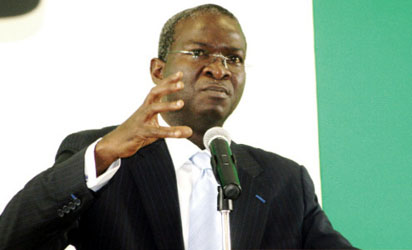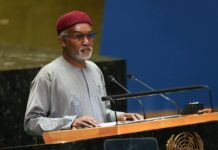
Minister for works,power and housing
The Minister of Power, Works and Housing, Mr. Babatunde Fashola SAN, at the weekend in Lagos unveiled the roadmap to the Federal Government’s Housing Programme saying it was aimed at evolving a nationally acceptable design that reflects diversity of culture and weather in the country while targeting the low and medium income earners.
Fashola, who spoke at the 1st City People Real Estate, and Housing Lecture, said aside evolving nationally acceptable designs that respond to and accommodate the country’s diversity, the roadmap also involves standardizing the design towards mass production.
According to the Minister, the process also involves standardizing fittings towards reenergizing local supply chain and economic diversification through Small and Medium businesses adding that this would lead to industrialization of construction which would, in turn help to reduce delivery time from the estimated 18 months to about six months for a standard flat.
Noting that the deficiency in housing was largely due to the fact that the cost of building was high leading to high cost of both purchase and rent, Fashola said the present roadmap targets the low and medium income earners who, according to him, are first time home owners
The Minister said aside certifying and accrediting Developers from the Private Sector, the roadmap was aimed at proving the workability and national acceptability of the new concept which, according to him, would be supported through Government funding in the “Short Term”.
Describing 100 per cent home ownership by the population of any country as utopian, Fashola declared. “The truth, which we must accept, is that 100 percent home ownership is an ideal, but the reality is that, best practices in places like the UK and Singapore are stories of a mixture of ownership and rental”.
“Success is defined and measured by the increasing number of tenants who become owners and not by the attainment of 100% home ownership because owners today may become tenants tomorrow if they fall on hard economic times, just as tenants today may become owners in a season of prosperity”, he said.
The Minister, who said his thoughts were directed on how to gradually and consistently increase the number of tenants who become owners, with a focus on first-time owners, said that the only way to achieve the thought was through mortgage, adding that the present system whereby people who earn their salary monthly were made to pay rent in advance was abnormal.
“It reinforces the need for a credit system in our real estate sector, where payments for rent are matched not only to the quantum but also the timing of income”, he said adding that people who get paid weekly, monthly or yearly, should pay their rent weekly, monthly or yearly.
According to the Minister, aside relieving a lot of pressure on ordinary working people, it would “allow increased occupancy of many flats that are now empty across our country because people cannot pay multiple year advance rent from weekly or monthly incomes received in arrears”.
Again reinforcing the need for mortgage financing as a means to increase the rate of home ownership in the country, Fashola added that it would both reduce the frustrations of landlords who depend on their houses for income and who are saddled with defaulting tenants on one hand; and the trauma of families with children who are unsure when they will be thrown on the streets on the other hand.
Unfolding the concept, the Minister, who announced the conclusion of “the nationally acceptable designs that respond to and accommodate our diversity”, said the Ministry was able to reduce the myriads of designs from across the country to 21 from which it worked down to 12 and finally to six different designs.
He gave the summary of the designs to include 1,2 and 3 Bedroom bungalows, with court yards, that respond to the climate situation and cultural leanings of the North, to be built in states in the North East, North West and North Central parts of Nigeria and blocks of 16 and 24 flats of 1,2 and 3 bedrooms and Bungalows of 1 and 2 bedrooms to be built in the South-South, South-East and South-West of Nigeria and the FCT.
“These are broad classifications without details of special adaptations to be made in some states, based on our research and the experience of our diverse team of architects in the Ministry who come from all parts of Nigeria”, he said adding that the designs did not contemplate those who wanted duplexes or bigger houses.
According to him, “They contemplate those who we think are in the majority and who are the most vulnerable, the first-time home owners, who do not earn large incomes, in the civil service, junior workers in private companies, young families where husband and wife can pool their incomes together to qualify, artisans, drivers, market men and women, whose income bracket falls within grade levels 9 – 15 in the public service”.
Fashola, who noted that in all the nation’s post-independence history only two major housing initiatives readily come to mind- the Lateef Jakande initiative which was localized to Lagos and the Shehu Shagari initiative which was national, declared, “One common thread they share is that they have not been replicated or continued – so sustainability is a problem”.
“Another commonality was that they occurred at a time when our national currency was very strong. The Naira traded at almost parity with the Dollar which is our currency of reserve”, he said adding that the Shagari Housing also did not incorporate enough diversity to reflect different weather and cultural differences in the country; and therefore, there were places where acceptability was low.
The Minister who declared that the present housing initiative was “much different”, however, added, “Whatever the situation we must salute the courage and the service of these pioneers” while acknowledging the difficulty in achieving a total housing coverage for every segment of the population.
“It is difficult, if not impossible for Government to provide all Housing solutions for all diverse types of demands, such as those who want detached buildings, those who want duplexes, those who want flats and indeed those who cannot even afford to own, but can only afford to rent”, he said.
Thanking the organizers of the lecture, City People Media Group for leading the way in pioneering a housing conversation, Fashola praised the initiative of the tabloid which, he said had dared to be different from the popular tabloid tradition which, according to him always conjures and evokes other images like Beautiful People, fashionable people, the Rich and the famous, glitz and glamour as well as those of scandal, nudity in some cases, sometimes outrightly false or baseless reports.
But according to him, “To my knowledge, City People is not that. But two images that tabloids rarely or never evoke automatically is Governance and Ideas. City People is both of these images, and this perhaps explains why it has outpaced and outlasted some of its competitors who are either gasping for air or have given up the chase”.
Describing the Publisher, Mr. Seye kehinde, as “the self-effacing man behind City People who dares to be different by convoking the 1st City People Real Estate, and Housing Lecture, Fashola declared, “I am delighted to accept your invitation to speak at the inaugural lecture, by which you ask me to share “My thoughts on how to move the Housing Sector Forward.”
“In Governance, City People has sought to inspire public servants through its annual recognition and awards ceremony. In the area of ideas, City People dares to be different. It follows the view that ideas rule the world and convenes this summit to challenge thinking and hopefully inspire action towards tackling a problem that offers many opportunities”, he said.
In his welcome address, the Chief Executive Officer of the City People Media Group, Mr Seye Kehinde said his organisation decided to organise the lecture in order to deepen the conversation in the real Estate and Housing sector as “a vital sector of the economy that needs all the creative ideas it can get.”
Noting that his organisation was particularly happy that the Minister of Power, Works and Housing agreed to deliver the maiden lecture, Mr Kehinde declared, “you will agree with me that he is eminently qualified to flag off this conversation.”
Continuing, the City People Publisher said, “When the President of the Federal Republic of Nigeria, President Muhammadu Buhari decided, in his wisdom, to saddle this eminent Lawyer, technocrat and Politician with 3 of the most problematic sectors of our economy, then you know he has made a bold statement to the fact that Mr Babatunde Raji Fashola is able and capable to take on such momentous tasks.”
“And l have watched him from the sidelines and l have seen the systematic approach he has adopted to galvanise his team in the 3 ministries towards the desired goal”
On the focus of the lecture, Mr Seye Kehinde declared, “But today our focus is Housing. We are here to do two things. One to hear the Hon Minister share his thoughts with us on Housing and what he has decided to do in that sector. And two, for the stakeholders to also share with the Minister the ideas they have on how to move the Housing sector forward.”
The well-received Lecture which was followed by a robust Question and Answer session had in attendance Chief Executives of various organizations, professionals and other stakeholders in the built industry as well as the Senator representing the Lagos East Senatorial District of Lagos state, Senator Olugbenga Ashafa among other dignitaries.





